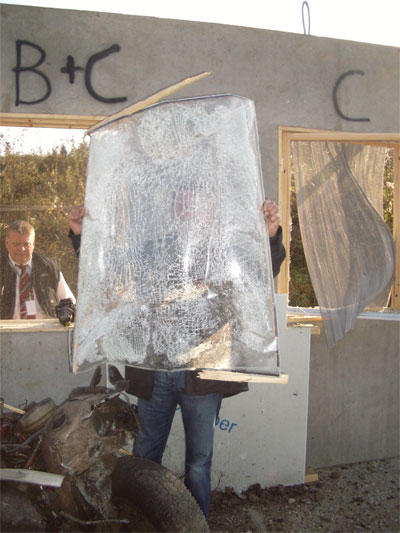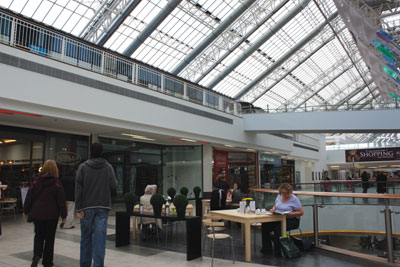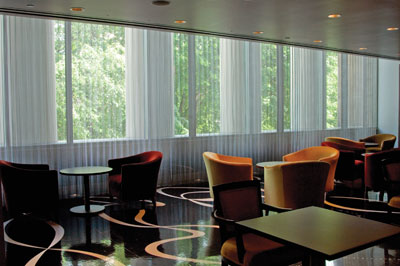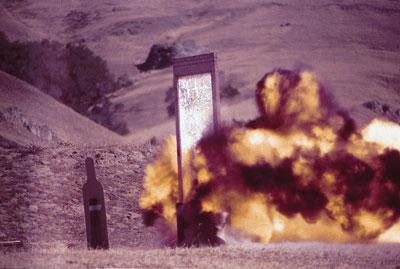
Features
Business intelligence
Contracting
Product Showcase: June 2011
June 10, 2011 By Stefanie Wallace
Profilon ER-1 was developed in Germany and is said to be the thickest
and toughest retrofit film product available tested to the European ER-1
standards.
Thick and tough

|
Profilon ER-1 was developed in Germany and is said to be the thickest and toughest retrofit film product available tested to the European ER-1 standards. ER-1-EN 13541 (NS) is a standard requiring the glazing system to be able to withstand a blast over-pressure of in excess of 7.2 psi with a duration of greater than 128 milliseconds.
What does this mean in laymen’s terms?
Profilon ER-1 has been actually tested under both U.S. and European test criteria and has proven itself effective at almost double the current U.S. standards. Profilon ER-1 has exceeded the GSA Class 2 standard tests of the U.S. government.
Why does this matter?
Protection from explosive blasts is not something that happens in a military range or a laboratory. Most acts of terrorism occur in urban settings where buildings and traffic preclude creating large standoff distances from a targeted building or place. The ability of Profilon ER-1 to work effectively relatively close to an explosion means that a higher level of protection can be achieved without the need for expensive re-glazing of a building. This has proven cost effective for many facilities worldwide where access to the building is public and the perimeter cannot be secured sufficiently to set back a threat far enough to prevent catastrophic damage. Thinner films available on the market may fail in this respect, regardless of frame attachment used.
Profilon ER-1 is used in conjunction with Profilon AXA1 – UL/ULC listed security film to provide the most effective protection of a building while keeping an eye on the budget.
Profilon has been a popular choice for blast mitigation for embassies, government buildings, commercial facilities and the oil and petrochemical industries worldwide for over 25 years. Profilon is also used extensively in Canada by facility managers for physical protection of glass against vandalism and break-and-enter and is virtually undetectable on glass with over 90 per cent visual light transmission.
Stops falling glass

|
Dymond protective window films were recently used in a 300,000-pound contract at the St. Enoch shopping centre in Glasgow, Scotland, to protect shoppers from the risk of falling glass from the roof.
Despite modern manufacturing methods that make the condition very rare, the risk of nickel sulphide in toughened glass presents an ongoing headache for facilities management companies. Nickel sulphide crystals can cause toughened glass to shatter spontaneously and without warning. If that toughened glass forms part of a large glass roof in a shopping centre, then you can run the risk of killing someone.
Glasgow’s St. Enoch shopping centre is famed for its glass roof, so when the centre was refurbished recently, facilities management company, Ivanhoe Cambridge, wanted a solution to prevent the glass from shattering and risking shoppers’ wellbeing.
Therefore, Deans Ltd., the specialist contractor for the project, installed Dymond Defender two-ply anti-shatter film – an adhesive-backed polymeric film – on the glass units in the roof of St Enoch shopping centre, which will keep them intact should the units unexpectedly shatter.
“Glass panels, like the ones at the St. Enoch Shopping Centre, can weigh up to 30 kilograms, so it is vital that technically advanced systems are used to maintain their integrity,” Ken Amos, Dymond Products managing director, said.
The decision to install Dymond Products’ anti-shatter film was a wise one because one of the glass units did subsequently shatter unexpectedly. However, it was held in place by the film and retention system. The glass was then replaced safely and discreetly out of hours, so that the shopping centre could open as usual without any disruption to business.
Commenting on the suitability of the film on such a project, Ken said: “We are particularly proud that Dymond Defender anti-shatter films have been specified by the U.K. Home Office Scientific Development Branch for Blast Mitigation for windows in buildings, and the film has recently become one of the first products to pass a new international safety glazing standard: ISO draft 16933 Glass in Building Explosion Resistant Security Glazing.”
Dymond Defender has also been certified to BS EN 12600 Class 1B, BS 6206 1981 Class A and ANSI Z97.1 Class A. The Dymond Platinum Edge Retention system is certified to ISO 16933, TN47 and GGF 5.18.5.
Dymond products are unlike any other product on the market, primarily because they are supplied by Garware, an integrated film manufacturer.
Blast curtains
 |
Cascade Coil Drapery and its recently formed affiliated company, Cascade Coil Defense Systems, has introduced a new blast-mitigation fabric, GuardianCoil.
The patent-pending GuardianCoil works by stopping and/or entrapping flying objects – glass shards and other materials – resulting from external primary or secondary bomb blasts or explosions. GuardianCoil’s interwoven (metal) coils stretch to absorb the flying glass splinters and other objects. GuardianCoil features a special retainment system that works like a glove to catch and deposit glass onto the floor below a protected window.
In multiple tests, GuardianCoil achieved high levels of government safety compliance based on multiple General Services Administration (GSA) government standards for blast mitigation. The company received its GSA government contract in September, 2010; GuardianCoil is offered under two categories, Blast Mitigation and Architectural Drapery.
Cascade Coil president Ron Schoenheit foresees many uses for GuardianCoil in embassies and consulates, airports, military bases, government office buildings and hotels and other private businesses. Hotels in particular are vulnerable targets for terrorists. According to Peter Greenberg, in a CBS Evening News report, “American-branded hotels are the choice for terrorists.” The NCTC reports that, worldwide, 60 hotels have been attacked since Jan. 1, 2009.
GuardianCoil is available in four major weaves, ranging from 3/32-inch to 1/4-inch. The blast-mitigation fabric is produced in regular carbon steel or stainless steel in several gauges. A green product, GuardianCoil is easy-to-clean, cost-effective and even comes in any colour, thus avoiding the prisonlike, negative psychological feel associated with many blast-mitigating products. Over the years, Cascade Coil architectural drapery has filled the need for window opacity, allowing natural light and unobstructed views, and indeed is one of the product’s distinctions.
People like to look outside their windows. This fact of life gives GuardianCoil a major advantage over other blast-mitigation fabrics, which can obscure windows. In more than one instance, Schoenheit learned that workers regularly push back existing blast-mitigating fabrics so they can see outside, thereby negating any blast-protection value.
GuardianCoil is not only translucent so people can see out, it also can be configured to fit any size window. For additional protection inside potentially vulnerable spaces, GuardianCoil can be used as decorative interior partitions or room dividers.
Super-thin film

|
Life safety protection is the key objective when defending against a blast – whether intentional or accidental – to minimize your risk and liabilities. Upgrading existing glass with film has been proven to save lives by keeping glass shards together. 3M invented micro-layer film technology to do just that.
Micro-layers are more flexible and tear resistant than basic layered window film products. The 28 and 42 micro-layer films absorb more blast energy and deter crime to provide a higher level of life safety protection for people and property.
Windows are the weakest link in perimeter security. Retrofit your windows by upgrading the glass and strengthen the weakest link in your security system.
Print this page
Leave a Reply